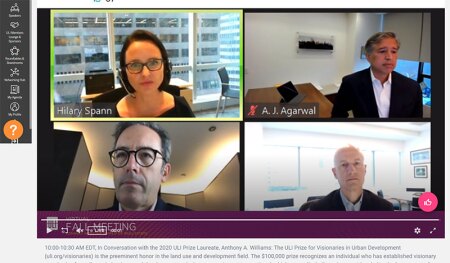Prospects for economic recovery may be slow and uneven over the next couple of years and will be heavily influenced by the provision of additional economic stimulus from government and the availability and efficacy of a vaccine for COVID-19, top-tier real estate experts said during a State of the Industry panel at the 2020 ULI Virtual Fall Meeting.
Moderated by ULI Global Chairman and Boston Properties CEO Owen Thomas, the panel consisted of Hilary Spann, managing director and head of Americas real estate investments for CPPIB America; A.J. Agarwal, senior managing director of Blackstone; and François Trausch, global CEO and chief investment officer of Allianz Real Estate.
Unlike during the global financial crisis of 2007–2008, capital has remained available and at low cost during the current economic downturn, panelists noted. Trausch predicted that lower interest rates will remain in place for longer than they otherwise would have without the pandemic’s economic effects and fiscal policies intended to support economies. Agarwal noted that financing costs are one-third lower than before the pandemic and advocated for passage of a second stimulus package to keep economic demand from flagging.
Technology and Change
Closures and restrictions imposed in reaction to the pandemic have drastically accelerated trends toward digitization and the adoption of new technologies—changes that panelists expect to remain for the long term.
“What was on track for three-year adoption is now [happening in] six months,” Spann noted. She said that her firm is now using virtual leasing technology and, for construction, they are using visualization technology.
“Technology—we really feel it now in everything we do,” Trausch said. He added that corporate attitudes toward working from home may exhibit “a certain form of democracy.” The flexibility to work from anywhere used to be reserved for executives, he said. Now it is being extended across the workforce.
Warehouse and Data Centers
Widespread adoption of online meetings and online shopping has boosted related real estate sectors such as data centers and warehouses/distribution centers. Agarwal noted that Blackstone owns 1 billion square feet (93 million sq m) of warehouses globally (particularly last-mile warehouses close to consumers) and continues to acquire space. For every $1 billion in e-commerce growth, you need 1 million more square feet (93,000 sq m) of warehouse space, he said. “We see this trend not truncating in the near term.”
Retail Space
That same e-commerce trend, paired with retail bankruptcies, has accelerated the decline in demand for retail space. Trausch asked, “Will there be enough retailers to fill the malls?” Managers’ concern about the ability to re-lease vacant space puts continuing retailers in a very good position to negotiate lower rents, he added. He advises looking to Asia for examples of how malls are being repurposed to other uses, such as hospitals or office space. And successful malls are incorporating space for community uses, such as cooking or sewing classes. “The community aspect, which is quite developed in Asia,” he said, “look to that.”
Office Demand
Thomas pointed to four drivers of demand for office space:
- Recession-related decline in demand. The typical decline for demand that occurs during a recession is happening now.
- Location of jobs. While there has been some migration out of major cities, much of that has gone to commutable suburbs of those cities. We are not seeing a lot of migration to smaller cities or to far-away suburbs, he said.
- Increased in-office density. The trend has been toward placing more employees closer together. “That clearly is going to completely reverse,” Thomas said, adding that all of Boston Properties’ customers are removing workstations and reconfiguring spaces.
- Work from home. “I think that work from home is here to stay,” he said. But companies are recognizing the value of their offices for supporting company culture, onboarding of new employees, and training. “In-person work now has only been strengthened from the experience with COVID-19,” Thomas said.
Hotels and Resorts
Agarwal predicts a “long, uneven recovery” for hotel properties, with the potential that hotels do not return to 2019 levels of profitability until three or years from now. There could be a burst of pent-up consumer demand for resort and recreational stays once pandemic concerns are eased, and demand for group meetings is likely to recover. But he took a wait-and-see approach to business transient travel, as some less-critical travel is replaced by videoconferencing.
Multifamily and Student Housing
Panelists viewed affordable, suburban rental housing, particularly garden apartments, favorably. Spann said that student housing is leasing well, despite uncertainty over universities’ plans for on-site versus remote instruction. “Students want to be on campus or near campus,” she said, and predicted that once a vaccine is widely available, tier-one universities will bounce back to pre-COVID levels of demand. Tier-two or tier-three institutions may be weaker, she said. Trausch added, “Student housing should have a good future.”
2020 ULI Virtual Fall Meeting registrants can access a recorded version of this session.



